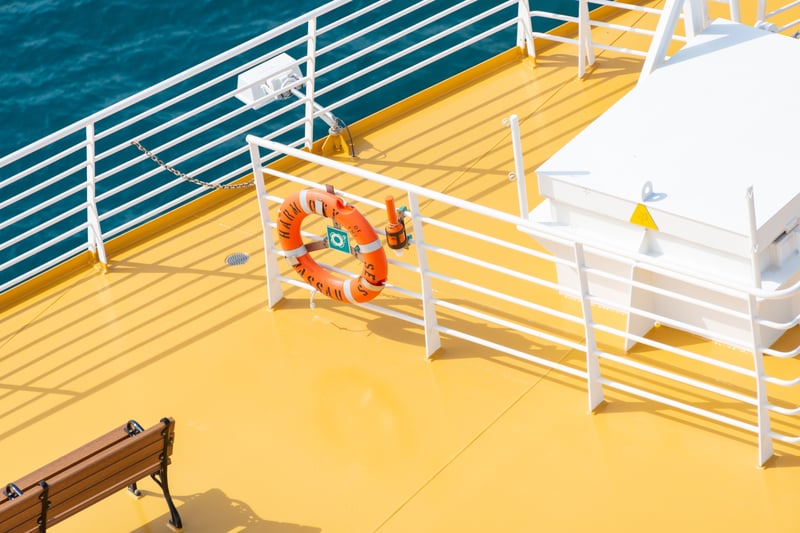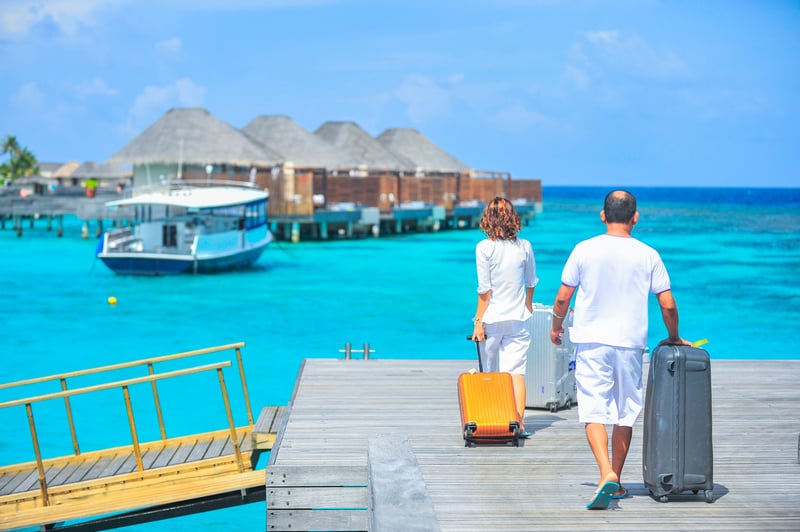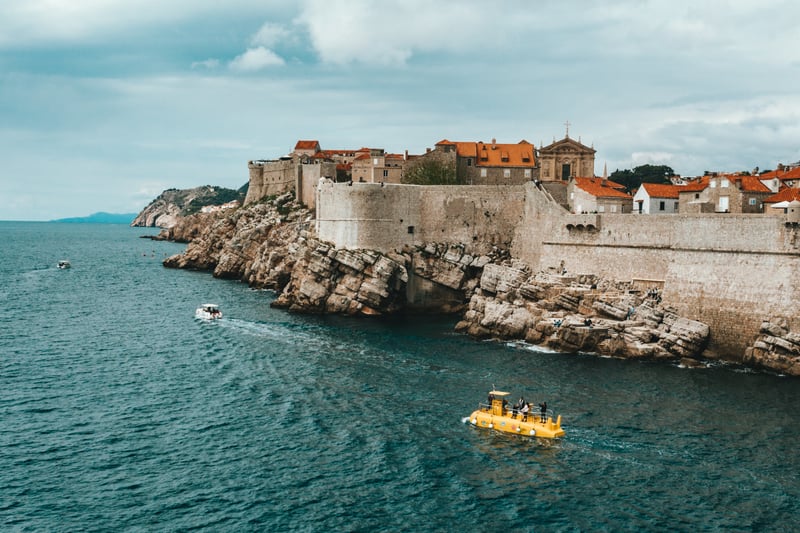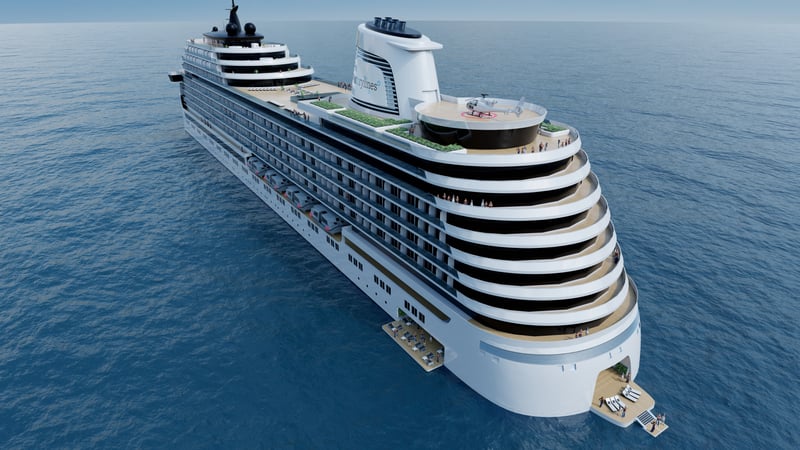
Travel the world from the comfort of home? Hmm, how does that work? And we're not talking about strapping on a VR headset and virtually traversing the world from your couch (although, that will probably be a thing soon too, unfortunately). No, we're talking about the real world - You can actually take your home with you around the globe now. In this world travel blog, we welcome the era of the residential ship.
The latest trend of buying residences at sea extends beyond avid cruisers. In fact, many people don’t particularly like vacation cruise ships who are drawn to this forward-thinking concept due to the ease of traveling the world with everything taken care of. Itineraries, navigation, maintenance, housekeeping, provisioning, cooking, cleaning and staffing are all provided for, making it easy for residents on a ship to travel the world conveniently and uniquely.
However, the increasing demand for longer voyages hints at where the idea of living at sea came about.
The Era of the Epic World Cruise

At the present moment, World cruises have seen a significant rise in popularity, driven by the allure of exploring diverse global and budget-friendly destinations in one seamless journey. These epic voyages appeal to travelers seeking an immersive experience that combines luxury, adventure, and convenience. Unlike traditional cruises, world cruises often last several months, visiting dozens of countries and offering in-depth cultural encounters, making them ideal for those with time and resources to fully embrace a global exploration while only unpacking once.
Round-the-world ticket travelers also benefit from the growing trend toward expedition-style cruising, which caters to those looking for more authentic, transformative travel experiences, as opposed to your standard budget travel book. This segment has grown by 67% over the past four years, highlighting the shift in traveler preferences towards longer, slower travel and more enriching journeys.With cruise lines such as Oceania's 180-day World Cruise selling out in 30 minutes and the Regent Seven Seas 150-night epic world cruise selling out before bookings officially open, there's a clear demand for this style of travel. Many travelers are no longer satisfied with the same country—they desire world travel in a way that keeps travel costs down. Multiple airfares, hotel bookings and transfers can not only be stressful, but travel costs quickly add up.
As a result, consumers are recognizing that around-the-world-voyages can save money while enabling you to properly relax and check off the sabbatical bucket list without having to worry about all the logistics and subsequent headaches that an air-based around-the-world itinerary involves.
The Downsides of the World Cruises
 While world cruises are the easiest method and an amazing way to travel the world since you only have to unpack once, itineraries are already planned and chores are nonexistent, there are plenty of global travelers who don't love the idea of big cruise ships with rushed port visits, lounge-chair wars and crowds. They are looking for more culturally immersive experiences and they want to travel around the world in sustainable luxury.
While world cruises are the easiest method and an amazing way to travel the world since you only have to unpack once, itineraries are already planned and chores are nonexistent, there are plenty of global travelers who don't love the idea of big cruise ships with rushed port visits, lounge-chair wars and crowds. They are looking for more culturally immersive experiences and they want to travel around the world in sustainable luxury.
Their issue with cruising derives not from the mode of transportation itself but from the actual goings-on. Here are some of the criticisms non-cruisers have about the large commercial cruise liners:
- Crowds and queues
- Set dining times
- Less-than-stellar entertainment
- Hidden costs
- Intoxicated and misbehaved guests
- Buffets and more buffets
- Cheapskates seeking free accommodation and hitch-hiking lounge chairs
- Feeling rushed to see the destinations with only hours in ports of call
- The impression that everything is about separating you from your money
- The general lack of sophistication and culture
And that's only the experience on board. Many port cities and destinations are pushing back against the "day-trippers" that large cruise liners deliver. The "day-tripper" phenomenon, where large numbers of cruise passengers flood popular destinations for brief visits, often overwhelms local infrastructure and contributes little to the local economy. Cities like Venice, Barcelona, and Amsterdam have started implementing restrictions to manage the influx, citing concerns over over-tourism and the strain on cultural heritage sites
Adopting a Travel Lifestyle

As technology improves and the increasing desire to work remotely, many are making full-time travel their lifestyle. The rise of digital nomads in hotspots such as South East Asia, Cape Town and various places in South America practice world travel indefinitely. The idea of travel reserved for only two weeks a year is dying. Online courses and income streams are enabling a completely different work-life balance.
Yet again, such a lifestyle can still come with the stress of the logistics previously discussed with global travel. Traveling from one continent to multiple countries, continually finding new accommodations and the search for decent Wi-Fi gets exhausting. Then there's the struggle for digital nomads to make new friends and the subsequent loneliness that comes from traveling solo.
While cruises are attracting this new kind of remote worker, the internet situation has typically been a sore point. In short, you pay a lot for a substandard service. However, this is changing with many cruise lines adopting new satellite internet technology such as Starlink, meaning you can work from such remote places as when cruising through the Panama Canal or through Southeast Asia.
Evolution of the Residential Ship

The concept spawned way back in 2002 when MS The World created history with its onboard community of residents embarking on a continuous journey across the oceans and continents. Feeling at home, comfortable, and able to do things we want to do when we want to do them is the ultimate experience we all seek when traveling around the world. As discussed, some methods of travel don’t deliver on those ideals and it has led many people to inquire about the best possible way to travel the world.
Storylines MV Narrative, one of the newest and most exciting entries in the ‘condo at sea’ market, is attracting its fair share of non-cruisers into the fold. So why are so many people who don't love cruising buying private residences on the ship? This could be due to several reasons, including:
- Not living out of a suitcase (unpack once)
- No jet lag
- Not lugging luggage around to each new destination
- Having the familiar comfort of home
- Belonging to a community
- Modern conveniences
- No language barriers
- A healthy lifestyle centered around wellness and longevity
- Ability to grow own food in organic farms on-board
- Not having to cook or clean (although you can if you want)
- Spend time to properly explore and discover the destinations you visit
- Freedom to disembark for a land trip - for example; Costa Rica, then meet up with the ship at a future port
- Not having to deal with all the logistics involved with flights, hotels, itineraries, etc.
We could go on! But that's enough for now. What's important to know is that Storylines has addressed the issues that come along with the large cruise liners, and then some.

"I'm not a big fan of cruise ships but I bought a condo on a ship. The high turnover of thousands of guests can be problematic as we all know now, but that won't be the case on MV Narrative. Also, it is built for residential life, not vacationing. I prefer high-quality organic and local food over vast quantities of buffet food and the Narrative has addressed that as well. I've traveled a lot of different ways including RVing,
homestays, flights/hotels, and this is by far the most convenient way to travel the world that I have found."
~ Mark from UK, future Storylines resident
“We are not cruisers. The ship will be our home. It will be filled with residents who share our love of travel and exploration. It will be a city on water. We also like that it’s an all-inclusive life; most things are covered in the monthly fees. There will be medical care on board. There will be families, singles, retirees – all ages on board to make it a true community.”
~ Cynthia, Storylines resident from USA
“We've had many opportunities to travel and spend time on cruise ships over the years. We were so enamored of the cruise ship lifestyle — though perhaps, sometimes, not of the company we were keeping on board.”
~ Martin and Melissa, Storylines residents from New South Wales
That's what the Storylines lifestyle is all about and that's why it's attracting so many 'non-cruisers'. It's about living amongst a community of like-minded explorers and traveling around the world from the comfort of home.
So, what do floating homes look like?

Storylines offers a diverse selection of residences, each thoughtfully crafted to combine comfort, elegance, and cutting-edge design, ensuring a perfect fit for your lifestyle as you explore the world. Prices range from $625,000 for an inside studio to $8,600,000 for the luxurious premium penthouse.
 For those interested in part-time residency aboard the ship, Storylines offers 50% fractional ownership, similar to owning a vacation home. This option grants access to a luxurious residence for six months each year, allowing you to experience a different part of the world annually at a reduced cost.
For those interested in part-time residency aboard the ship, Storylines offers 50% fractional ownership, similar to owning a vacation home. This option grants access to a luxurious residence for six months each year, allowing you to experience a different part of the world annually at a reduced cost.

With nine different design options available, we’ll explore one from each of the five classes—RU1 to RU5—ranging from entry-level to premium four-bedroom penthouses with multiple balconies.

About Storylines:
Storylines offers a groundbreaking residential experience that redefines what it means to travel the world's countries from the comfort of home. Finally, a residential ship that provides a unique blend of adventure, luxury, and community, allowing residents to explore the globe without ever leaving the comforts of their elegant, custom-designed homes. Beginning with a focus on sustainability, immersive cultural experiences, and a sense of global citizenship, Storylines delivers a lifestyle that goes beyond conventional travel, creating a floating community where the world is your backyard. Whether through full or fractional ownership, Storylines offers a truly unparalleled course to live, explore, and contribute to the world.


